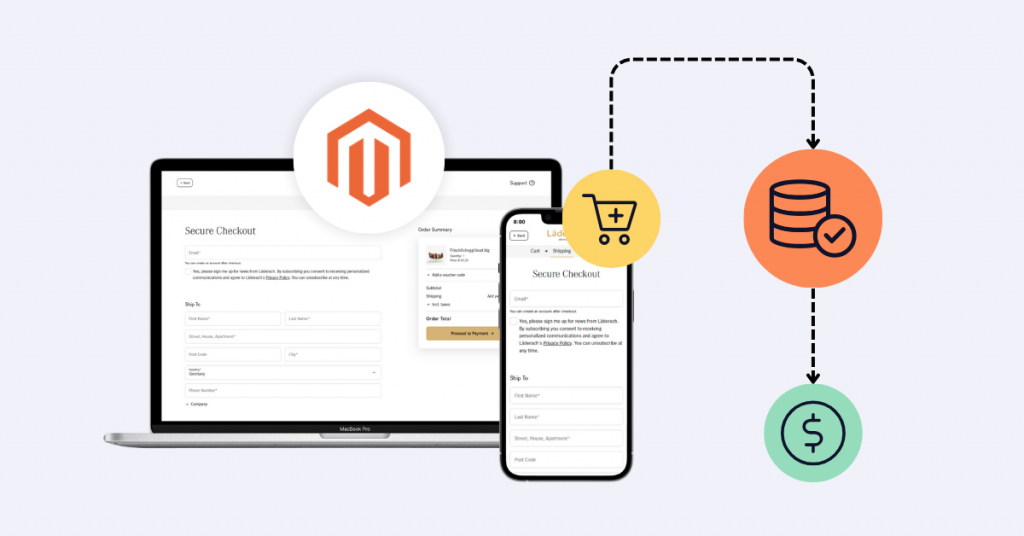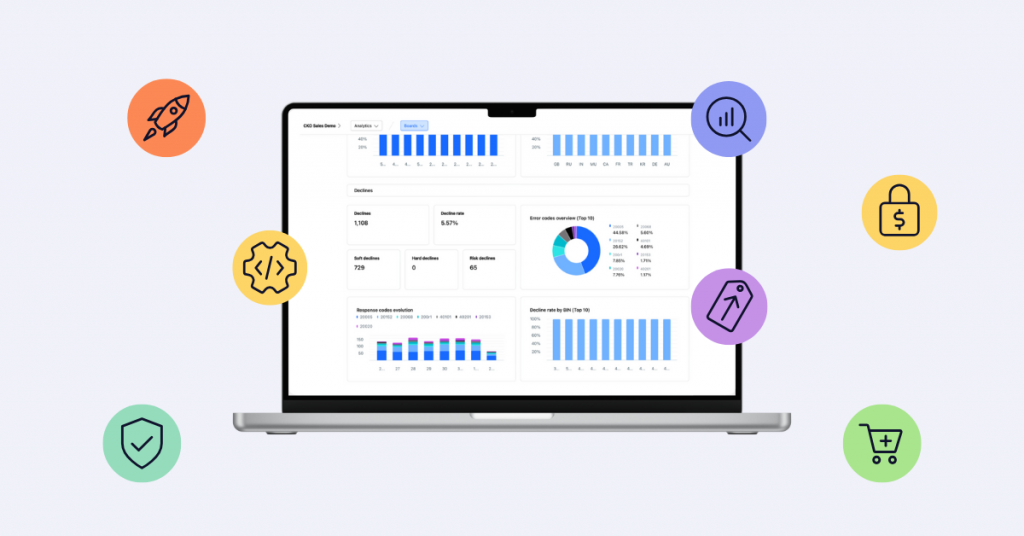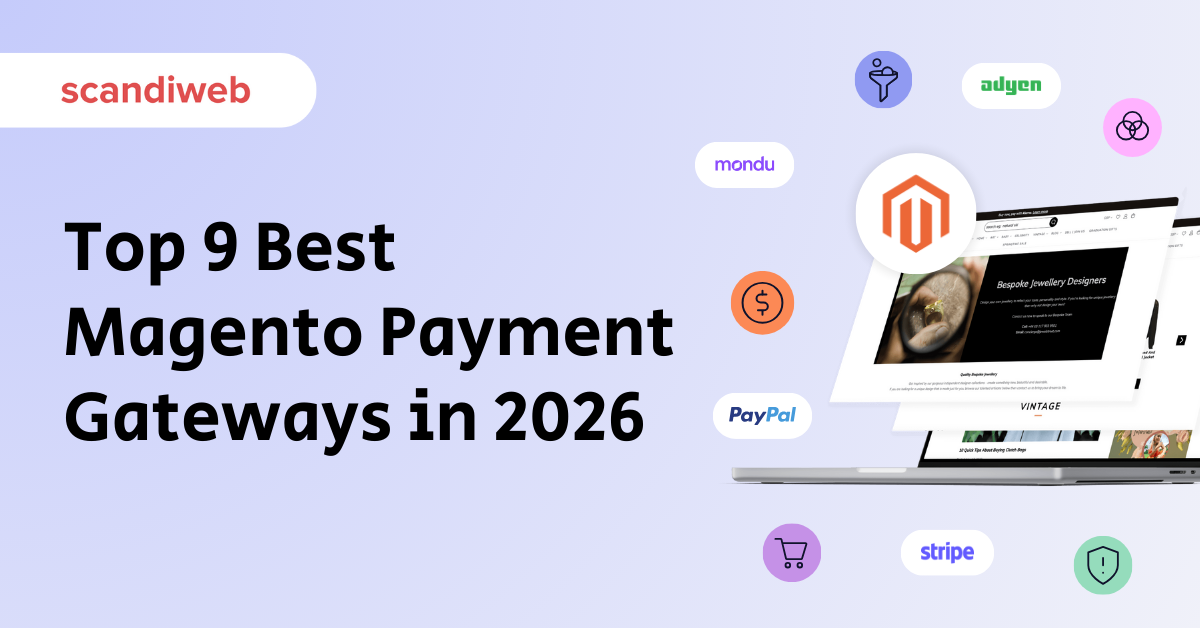A smooth checkout can make or break a sale, yet many Magento store owners overlook how crucial the right payment gateway is. The right Magento 2 payment gateway provider ensures seamless integration with your platform, reliable service, and a hassle-free checkout. Without it, you risk limited payment options, errors, and security issues—problems that hurt trust and cost sales.
Magento 2 (Adobe Commerce) offers payment gateways for businesses of all sizes. The right choice can streamline operations, build customer confidence, and boost revenue. This guide breaks down the top options, their features, and how to find the best fit for your store.
What is a payment gateway in eCommerce?

A payment gateway in eCommerce is the bridge between your Magento store and payment processors, enabling secure and smooth online transactions. It handles credit cards, digital wallets, and other payment methods, ensuring your customers have a hassle-free checkout experience. Some payment gateways can function as a payment processor, validating transactions and ensuring secure money transfers to merchant accounts.
Magento supports a variety of payment gateways tailored to different business needs, offering features like multi-currency support, real-time processing, and PCI compliance. Tools like Magento payment plugins and gateway extensions make it simple to expand your payment options and streamline tasks like credit card processing. The right Magento payment gateway integration helps you build trust, reduce cart abandonment, and keep your operations running smoothly.
Key features to look for in Magento payment gateways

We get it—cost is often the first thing you think about when choosing a payment gateway for your Magento store. After all, every fee adds up, and it’s crucial to find a solution that fits your budget without compromising on quality.
Start by checking the transaction fees to ensure they align with the features you’re getting. Consider the costs for different types of transactions, such as credit card payments and recurring payments. Keep in mind that some payment gateways charge monthly fees in addition to transaction fees. Make sure the gateway supports various payment methods, including credit and debit cards, and local payment methods, to cater to different customer preferences. If you offer subscriptions, pick a gateway with recurring billing to keep things simple.
To summarize, look for:
- Support for global currencies and seamless conversion for international stores
- Transparent pricing to manage transaction fees
- Scalability to handle increasing volumes
- Reporting tools for insights and decision-making
- Fraud detection to protect your revenue
- Integration with a merchant account for secure deposits
- Secure online payments to ensure authorization and transfer of funds with encryption and fraud protection
- Encryption and PCI compliance to protect your customers’ data.
9 top Magento payment gateways
1. Checkout.com

Checkout.com is a global payment platform that makes online commerce simple and efficient. Checkout.com is known for its flexibility and ease of use, besides these features:
- Fast and secure transactions with fraud prevention tools
- Support for over 150 currencies and localized payment options
- Customizable checkout to match your brand
- Single API for in-country acquiring and data insights
- Easy integration with an intuitive interface.
Pros and cons of using Checkout.com payment gateway
Pros of Checkout.com:
- Strong focus on global commerce and multi-currency processing
- Reliable and secure payment infrastructure
- Highly customizable for unique business requirements
- Comprehensive reporting and analytics tools
- Dedicated account management with 24/7 support.
Cons of Checkout.com:
- Limited presence in North America compared to competitors
- Fewer pre-built integrations, requiring more development effort
- Inconsistent customer support experiences without an assigned account manager
- Some users find back-office functionalities lacking.
2. Stripe

Stripe is a leading payment platform known for its versatility and developer-friendly tools, making it a great fit for Magento merchants. Key features of Stripe are:
- Support for 135+ currencies for smooth international payments
- Advanced fraud prevention tools like Stripe Radar
- Seamless integration with Magento and other eCommerce platforms
- Transparent pricing with detailed cost breakdowns
- Developer-friendly APIs for customization and scalability
- Comprehensive reporting tools for revenue, refunds, and transaction insights.
Pros and cons of using Stripe payment gateway
Pros of Stripe:
- Intuitive interface and easy integration with Magento
- Extensive global currency and payment method support
- Robust fraud detection powered by machine learning
- Transparent pricing structure with competitive fees
- Strong focus on eCommerce and flexible payment workflows.
Cons of Stripe:
- Some advanced features may require technical expertise
- Limited support for high-risk industries and in-person transactions
- Reports of account holds and inconsistent customer support
- Dependence on the platform could pose challenges during outages or disputes.
3. Adyen

Adyen is a global payment platform known for its seamless omnichannel payment capabilities, making it ideal for Magento merchants handling online, mobile, and in-store transactions. Besides that, key features include:
- Support for a wide range of payment methods, including mobile wallets and local options
- Advanced fraud detection using machine learning algorithms
- Detailed reporting and analytics to optimize payment performance
- Easy integration with Magento and other platforms.
Pros and cons of using Adyen payment gateway
Pros of Adyen:
- Global reach with support for multiple currencies and regions
- Unified platform for managing all payment channels
- Strong fraud prevention tools for secure transactions
- User-friendly interface with powerful reporting capabilities
- Dedicated customer success team for personalized support.
Cons of Adyen:
- Customer support response times can be slow for urgent issues
- Limited payment terminal options for in-person transactions
- Platform complexity may be challenging for non-technical users
- Potential for high fees and hidden costs.
4. PayPal

PayPal is a globally recognized payment gateway, making it a trusted choice for businesses of all sizes. Key features of PayPal are:
- Support for multiple payment methods like cards, bank transfers, and PayPal balances
- Operates in over 200 countries with support for multiple currencies and currency conversion
- Strong security measures, including fraud protection and encryption
- PayPal also interacts with the customer’s bank account to verify funds and implement fraud protection measures before completing the transaction.
- Buyer protection feature to encourage trust and enhance customer experience
- Point-of-sale systems for in-person transactions.
Pros and cons of using PayPal payment gateway
Pros of PayPal:
- Easy to set up and use, with a user-friendly interface
- Widely accepted and integrated with most eCommerce platforms, including Magento
- Global reach and multi-currency support simplify international transactions
- Versatile payment options, including bank transfers and PayPal balances
- Security features like fraud and buyer protection boost trust.
Cons of PayPal:
- High transaction fees, especially for international and business payments
- Potential for account holds and restrictions without warning
- Challenges in resolving disputes through customer support
- Limited flexibility for some businesses, with restrictions on multiple activities
- Risk of dependency on a single payment provider.
5. 2Checkout (Verifone)

2Checkout (now Verifone) is a global payment gateway known for its all-in-one platform, combining payment processing with tools like subscription management and tax compliance. Besides, 2Checkout is known for:
- Support for multiple currencies and payment methods, including PayPal and credit cards
- Merchant of Record services for handling tax compliance and local regulations
- Advanced subscription management tools for recurring billing
- Fraud protection to secure transactions and mitigate risks
- Easy integration with Magento and other shopping carts.
Pros and cons of using 2Checkout payment gateway
Pros of 2Checkout:
- Competitive transaction discount rates (TDR) compared to competitors
- Robust APIs for customization and integration
- Reliable platform for subscription management and cart functionality
- Global reach simplifying international sales
- User-friendly interface and easy implementation process.
Cons of 2Checkout:
- Occasional downtimes and technical glitches, though improved over time
- Risk of account suspension due to policy complexities
- Delays in implementing customization requests
- Currency conversion fees for local payouts, adding unexpected costs
- Lack of live chat support, relying on email for assistance.
6. Klarna

Klarna is a Swedish fintech known for its Buy Now, Pay Later (BNPL) service, letting customers split purchases into interest-free installments while boosting sales for merchants. Klarna is also known for:
- Support for various payment methods in one platform
- Simplified administration by consolidating payment providers
- Wide acceptance across numerous online retailers
- Potential to increase sales and customer loyalty with flexible payment options.
Pros and cons of using Klarna payment gateway
Pros of Klarna:
- Drives higher sales and average order values through BNPL options
- Offers convenience and flexibility for customers managing payments
- Simplifies operations by supporting multiple payment methods in one platform
- Enhances customer loyalty through flexible payment terms
- Widely recognized and accepted across a large number of retailers.
Cons of Klarna:
- Poor customer support for merchants, with slow response times and limited resolution options
- Challenges with merchant approval and inconsistent identity verification processes
- Potential for customer financial strain, with risks of late fees and negative credit impacts
- Reports of technical glitches and a laggy app experience
- Lack of transparency and flexibility in payment terms, such as limited options for early payments or single, one-time payments in advance.
7. Mondu

Mondu is a unique payment gateway focusing exclusively on B2B payments, specializing in BNPL solutions for B2B transactions that offer flexible payment terms to improve cash flow and reduce default risks. Besides this standout feature, Mondu is also known for:
- Seamless integration with online checkouts, telesales, and field sales
- Real-time credit and fraud checks using machine learning
- Merchants receive upfront payment while Mondu assumes default risk
- Administrative support for collections and dunning processes.
Pros and cons of using Mondu payment gateway
Pros of Mondu:
- Tailored for B2B commerce with flexible payment options
- Improves cash flow by paying merchants upfront
- Increases sales and average order values by offering payment flexibility
- Reduces administrative burdens, allowing businesses to focus on operations
- Simple integration with multichannel sales environments.
Cons of Mondu:
- Stringent account approval process may exclude some businesses
- Limited compatibility with certain suppliers, creating potential friction
- Slow customer support response times can delay issue resolution
- Insufficient transparency on payment structure and merchant fees
- Limited insights into broader payment gateway functionalities.
8. Planet

Planet is a financial services provider known for combining payment solutions with VAT refund services and integrated technologies, tailored for industries like retail and hospitality.
Key features:
- Multi-currency payment processing for global commerce
- Credit card processing and integrated financial services
- Cloud software solutions for retail and hospitality sectors
- Presence in 120+ markets, supporting international transactions
- VAT refund services tailored for the tourism industry.
Pros and cons of using Planet payment gateway
Pros of Planet:
- Strong global presence, ideal for businesses with international operations.
- Comprehensive approach, combining payments with software and technology solutions.
- Industry focus, particularly retail and hospitality, with tailored offerings.
- Decades of experience in financial services, enhancing reliability.
- Emphasis on positive customer experiences and digital innovation.
Cons of Planet:
- Limited information on core payment gateway functionality compared to leading competitors.
- Primary focus on VAT refunds, potentially sidelining traditional payment features.
- Unclear details on integration, pricing, and security measures.
- Unverified suitability for small to medium-sized businesses outside its target industries.
9. Bolt

Bolt is a checkout platform known for its “One-Click Checkout,” simplifying payments and reducing cart abandonment for Magento merchants.
Key features:
- One-Click Checkout for faster, frictionless payments
- Fraud Chargeback Guarantee to protect against financial losses
- Bolt Network to connect retailers with millions of shoppers
- Seamless integration with eCommerce platforms like Magento
- Mobile-friendly checkout design for improved user experiences.
Pros and cons of using Bolt payment gateway
Pros of Bolt:
- Optimized checkout experience increases conversion rates
- Strong fraud protection ensures peace of mind for merchants
- Easy integration with Magento and other platforms minimizes technical challenges
- Access to the Bolt Network may expand the customer base
- Excellent customer support, praised for responsiveness and helpfulness.
Cons of Bolt:
- Limited details on payment gateway features like supported methods and fees
- Potentially higher fees compared to other gateways, which may deter cost-sensitive businesses
- Occasional bugs and issues with the platform could disrupt checkout
- Security concerns when used on shared devices, posing risks in certain retail settings.
How to integrate a payment gateway in Magento 2

Installing a payment gateway in Magento 2 is not a complicated process. Here’s a step-by-step guide to help you through it.
- Once you’ve chosen a payment gateway that fits you the best, you’ll need to sign up for a merchant account with your payment gateway provider. Your merchant account will give you the login credentials you need to connect the payment gateway to your Magento store.
- From the Magento Marketplace or your payment gateway provider’s website, download the payment gateway extension. Follow the instructions to install it.
- Once the extension is installed, you’ll need to configure the settings in your Magento store. Enter your merchant account info, select your payment methods, and customize any additional features, such as recurring billing and subscriptions.
- Finally, test your payment gateway by making a test transaction. This will ensure payments are processing correctly and updating your Magento orders.
Integrating a payment gateway is straightforward, but if you want to ensure everything is set up correctly and tailored to your Magento store, a professional Magento developer can handle it seamlessly for you. Partnering with an expert guarantees a smooth integration process and optimized functionality.
Conclusion: Choosing the right payment gateway for your Magento store

Your payment gateway isn’t just a back-end tool—it’s the final step in your customers’ shopping journey. A poor choice can lead to abandoned carts, lost sales, and frustrated customers.
Every hiccup at checkout risks breaking customer trust. In today’s competitive market, a smooth and secure checkout isn’t optional—it’s essential. Businesses that prioritize the right payment gateway see fewer abandoned carts, happier customers, and sustainable growth.
Your customers deserve a seamless checkout. Choose a payment gateway that aligns with your goals and ensures your Magento store thrives!

Frequently Asked Questions
Which of the Magento payment gateways are the best?
The right payment gateway for Magento depends on your business needs. Some of the most popular options include PayPal, Stripe, 2Checkout, Klarna, and Adyen. Each of these gateways offers robust security, multi-currency support, and seamless Magento 2 integration, but their specific features and transaction fees will determine whether it is the best fit for you.
What is a Magento payment gateway?
A Magento payment gateway is a secure way for online transactions to communicate between your eCommerce store and payment processors. It allows you to accept credit cards, digital wallets, and other payment methods while meeting the highest security standards.
How do I set payment methods in Magento?
Access the Magento 2 Admin Panel and navigate to Stores > Configuration > Sales > Payment Methods. Here, you can enable or disable payment methods, configure their settings, and save your changes to update your store. Then, select your desired gateway, configure its settings, and enable it for your store.
How much does Magento payment gateway cost?
The cost of a Magento payment gateway varies by provider. Most gateways charge a transaction fee, which typically falls between 2.6% and 4% of the total sale amount. Some gateways also charge a flat fee per transaction, such as $0.30. Additionally, some providers may charge monthly fees or setup costs. Be sure to explore each gateway’s pricing structure to get an accurate picture of the total costs involved.
What are Magento 2 payment restrictions?
Magento 2 payment restrictions allow you to control which payment methods are available to customers based on a range of conditions. These conditions might include shipping methods, customer groups, product attributes, order totals, or geographic locations. By applying payment restrictions, you can tailor the payment options available at checkout to fit your business policies and customer expectations.
Explore our popular Adobe Magento services
Ready to upgrade your Magento store’s checkout experience? Reach out to us, and we’ll help you choose the best payment gateway and install it in your Magento store!
About scandiweb
scandiweb is a leading eCommerce agency, specializing in Magento development, payment gateway integrations, and end-to-end digital services. With a proven track record of delivering tailored solutions for global brands, scandiweb combines technical expertise with a client-first approach to help more than 600 businesses thrive online.



Share on: